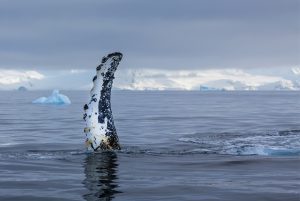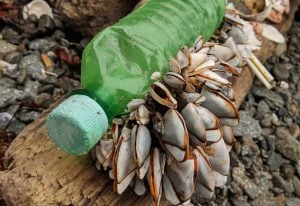Photo: R. Hucke?Gaete/UACH/CBA
Punctuation’s mark: Can we save the critically endangered North Atlantic right whale?
The North Atlantic right whale was the first large whale to be hunted commercially, the first to be protected internationally, and it will be the first to go extinct unless we prevent it. The Basques figured out how to slaughter the massive marine mammals for oil in the 12th century. Whalers from other nations followed, particularly European settlers to North America.
The species was, in the eyes of whalers, the “right” whale to hunt, thus the name. Not only were the whales rotund from thick layers of lucrative blubber, but they also swam near the coast and floated after death, making them easy to catch and retrieve. To boot, by harpooning a calf, a whaler could be sure of bagging its fiercely protective mother.
Read Punctuation’s story.
“There’s no coming back from this:” Why the global ocean crisis threatens us all
The short story: The ocean’s chemistry is changing in lockstep with climate change. That’s because the ocean is a global sponge. It absorbs about a third of the extra carbon dioxide we put into the atmosphere from burning fossil fuels, as well as most of the extra heat that carbon has trapped against the body of the planet.
But instead of examining the effects of all that carbon and heat on the ocean, most scientists were breathing a sigh of relief a decade ago. Better in the ocean than the air, they would say. The ocean was saving us from even more rapid climate disaster. Which was true. Except that carbon is awful for the ocean too, turning it warm, breathless and sour, or acidic.
Learn more.
Researchers find microplastics in nearly every sample taken in the Eastern Canadian Arctic
The researchers found that microplastics and other miniscule fibers were present in 90 per cent of the surface water and plankton samples, and in 85 per cent of the sediment samples. In other words, almost every sample collected in the Eastern Canadian Arctic contained microplastics and microfibers.
Read the story.
What lies beneath: Ghost gear in our oceans
It’s estimated that some eight million metric tons of plastic waste enters the global ocean each year. Of that, 640,000 tons is “ghost gear:” abandoned, lost or damaged fishing equipment that sheds microplastics and can kill or seriously injure marine life that becomes entangled in it. And, until recently, concerned fishers and environmentalists have actually been discouraged from cleaning it up.
Learn why.






